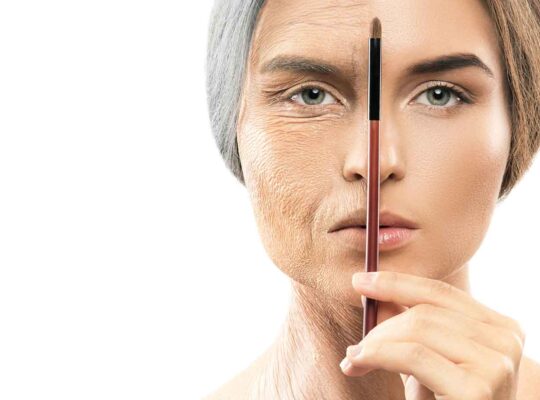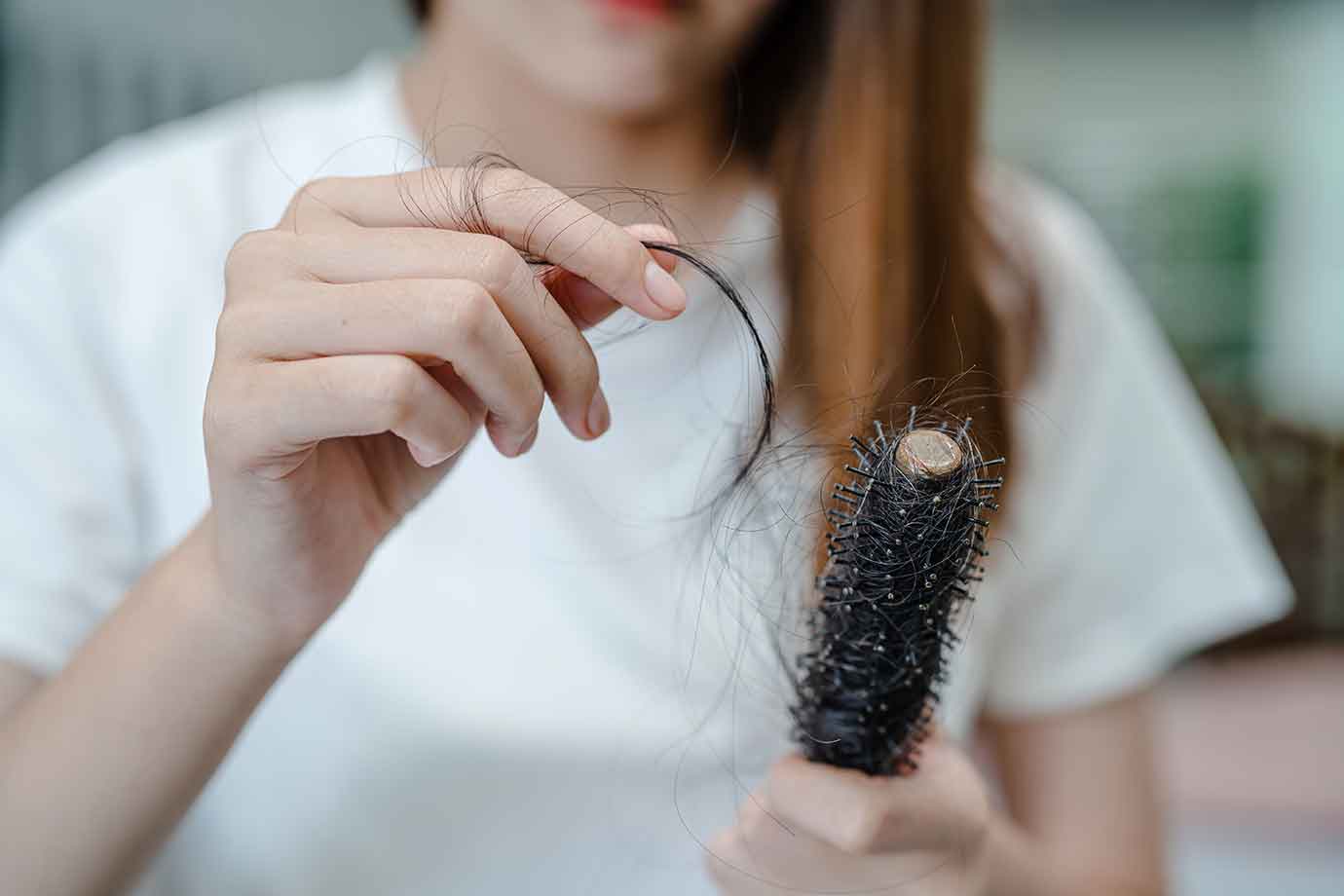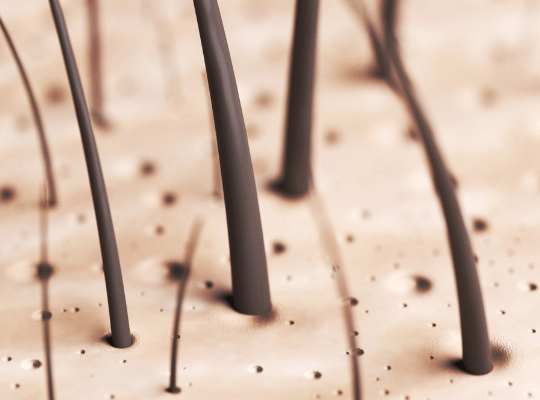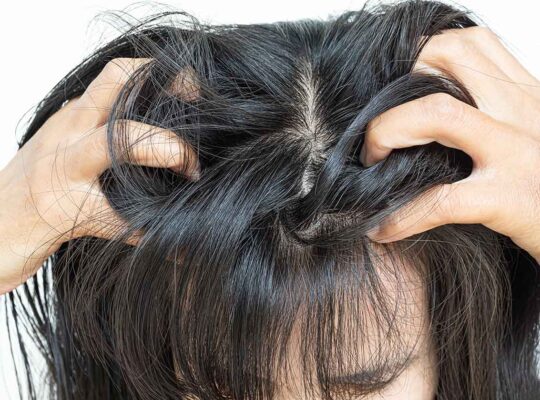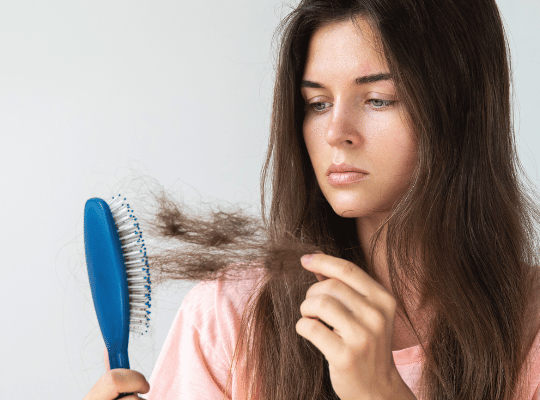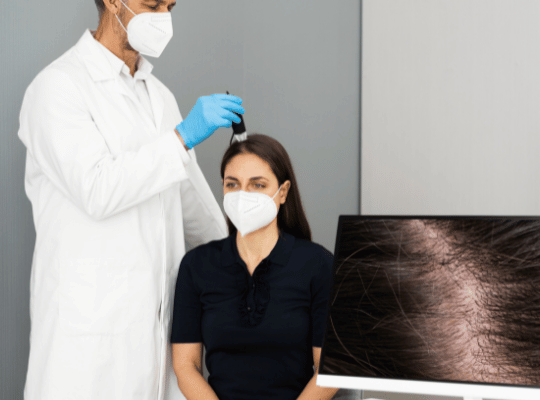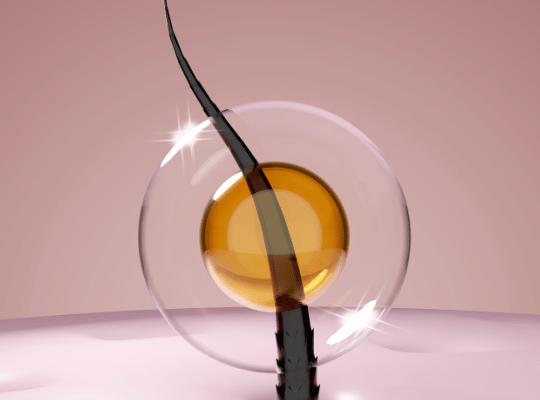Have you ever noticed more hair on your pillow or in your hairbrush? If so, you’re not alone. Many women deal with hair loss, and it can be a worrying experience. Whether it’s a few extra strands or larger patches of thinning, it’s important to understand why it’s happening and what you can do about it. This article will help you learn more about the causes of hair loss, explore different treatments, and give advice on when to see a doctor.
Understanding Hair Loss in Women
Common Causes of Hair Loss
There are many reasons why women might lose their hair. Here are some of the most common causes:
- Hormonal Changes: Events like pregnancy, giving birth, menopause, or problems with your thyroid can cause your hair to fall out.
- Genetics: If your mom or grandma had thinning hair, you might be more likely to have it too. This type of hair loss is called androgenetic alopecia, or female pattern baldness.
- Nutritional Deficiencies: Not getting enough important nutrients like iron, biotin, or vitamin D can make your hair weak and more likely to fall out.
- Stress: If you’re really stressed, your hair might stop growing for a while, causing it to fall out more than usual. This condition is called telogen effluvium.
- Medical Conditions: Some health problems, like polycystic ovary syndrome (PCOS) or autoimmune diseases, can lead to hair loss.
- Medications: Certain drugs, like those used to treat cancer, arthritis, or high blood pressure, can make your hair fall out.
Types of Hair Loss Specific to Women
Women can experience different types of hair loss. Here are a few that are more common:
- Androgenetic Alopecia: This is a type of hair loss that runs in families. It usually causes thinning on the top of the head but doesn’t affect the hairline as much as it does in men.
- Telogen Effluvium: This type of hair loss happens when your body goes through a big change, like surgery, illness, or a stressful event. It causes your hair to shed more than usual, but it’s usually temporary.
- Alopecia Areata: This is an autoimmune condition where your body’s immune system attacks your hair follicles, causing round patches of hair loss. Sometimes the hair grows back on its own.
- Traction Alopecia: This type of hair loss is caused by wearing hairstyles that pull on your hair, like tight ponytails, braids, or extensions. If you keep pulling on your hair, the damage can become permanent.
Traditional Remedies
Hair Oiling Techniques
Hair oiling has been a popular practice in many cultures for a long time, especially in India and Southeast Asia. It involves massaging natural oils into your scalp and hair. This is believed to make your hair stronger and healthier.
- Coconut Oil: Coconut oil is great for deep conditioning your hair. It can make your hair stronger and shinier by reducing the amount of protein your hair loses.
- Amla Oil: Made from Indian gooseberries, amla oil is rich in vitamin C and antioxidants, which help your hair grow and prevent it from turning gray too soon.
- Castor Oil: Castor oil is thick and helps stimulate hair growth. It improves blood flow to your scalp, which can help your hair grow faster.
Ayurvedic Approaches to Hair Care
Ayurveda is an ancient Indian system of medicine that offers natural ways to care for your hair. Here are some common Ayurvedic remedies:
- Bhringraj: Known as the “king of herbs” for hair growth, bhringraj can help reduce hair loss and encourage new hair growth.
- Shikakai: Shikakai is a natural cleanser that cleans your scalp and hair without stripping away natural oils, leaving your hair soft and strong.
- Neem: Neem has antibacterial and antifungal properties, which can keep your scalp healthy and prevent hair loss caused by scalp infections.
Modern Hair Loss Treatments
Modern medicine offers a range of treatments for hair loss. Here’s a comparison of some popular options, including how well they work, possible side effects, and costs.
Topical Medications
- Minoxidil (Rogaine): This is a medicine you apply directly to your scalp. It’s one of the most common treatments for female pattern baldness. It helps stimulate hair follicles to regrow hair.
- Effectiveness: Works moderately well, with results usually seen in 4-6 months.
- Side Effects: May cause scalp irritation and unwanted hair growth on the face.
- Cost: $$ (About $30-$60 per month)
Oral Medications
- Spironolactone: This is a prescription medicine that blocks the effects of androgens (male hormones) that can cause hair loss in women.
- Effectiveness: Works well for women with hormonal hair loss.
- Side Effects: Can cause weight gain, dizziness, and changes in blood pressure.
- Cost: $$ (About $10-$30 per month)
Hair Transplant Surgery
- Follicular Unit Transplantation (FUT): This is a surgery where hair follicles are taken from a part of your head where hair is thick and moved to areas where your hair is thinning or bald.
- Effectiveness: Very effective, with permanent results.
- Side Effects: Can cause scarring, infection, and requires recovery time.
- Cost: $$$$ (Typically $4,000-$15,000 depending on the extent of the surgery)
| Treatment | Effectiveness | Potential Side Effects | Cost |
|---|---|---|---|
| Minoxidil (Topical) | Moderate | Scalp irritation, unwanted facial hair | $$ ($30-$60/month) |
| Spironolactone (Oral) | Effective for hormonal | Weight gain, dizziness | $$ ($10-$30/month) |
| Hair Transplant Surgery | Highly effective | Scarring, infection, recovery time | $$$$ ($4,000-$15,000) |
Lifestyle Changes for Healthier Hair
Nutrition and Diet
What you eat can really affect the health of your hair. Eating a balanced diet full of vitamins and minerals helps keep your hair strong and healthy.
- Protein: Your hair is mostly made of protein, so you need to eat enough of it. Foods like eggs, fish, nuts, and beans are great sources.
- Iron: Low iron levels can cause hair thinning. Eat iron-rich foods like spinach, lentils, and red meat to keep your hair strong.
- Biotin: This B-vitamin is important for hair health. You can find it in eggs, almonds, and avocados.
Stress Management
Keeping stress under control is key to having healthy hair. High stress can push your hair into a shedding phase, making it fall out more than usual. Here are some ways to manage stress:
- Exercise Regularly: Staying active helps reduce stress and keeps your body healthy.
- Practice Mindfulness: Activities like meditation, deep breathing, and yoga can help calm your mind and reduce stress.
- Get Enough Sleep: Aim for 7-9 hours of sleep each night to give your body time to recover and repair.
Hair Care Practices
How you take care of your hair every day can also affect its health. Here are some tips for better hair care:
- Avoid Heat Styling: Using tools like straighteners and curling irons too often can damage your hair and cause it to break.
- Be Gentle When Brushing: Use a wide-tooth comb to detangle your hair, starting from the ends to prevent breakage.
- Wash Hair Regularly: Keeping your scalp clean is important, but avoid washing your hair too much, as this can strip away its natural oils.
Natural and Home Remedies
If you prefer natural ways to treat hair loss, there are plenty of home remedies that might help.
Essential Oils
Essential oils have been used for a long time to promote hair growth and improve scalp health. Here are some that are popular:
- Rosemary Oil: This oil is known for improving blood circulation to the scalp, which can help hair grow.
- Lavender Oil: Lavender oil can help reduce stress and promote hair growth.
- Peppermint Oil: Peppermint oil gives a cooling sensation that can help stimulate the scalp and encourage hair growth.
Herbal Treatments
Herbs can also be used to support hair health. Here are a few that are commonly used:
- Aloe Vera: Aloe vera has soothing properties that can calm an irritated scalp and promote healthy hair growth.
- Fenugreek: Fenugreek seeds are rich in protein and can help treat thinning hair.
- Hibiscus: Hibiscus flowers and leaves are often used in traditional remedies to stimulate hair growth and prevent hair loss.
DIY Hair Masks
Making your own hair masks at home is a fun way to nourish your hair. Here are some easy ideas:
- Avocado and Egg Mask: Avocado is full of healthy fats, and eggs provide protein—both of which are great for your hair.
- Banana and Honey Mask: Bananas help soften the hair, while honey is a natural moisturizer.
- Yogurt and Olive Oil Mask: Yogurt has lactic acid, which can help clean the scalp, and olive oil adds shine and moisture to your hair.
The Rise of Hair Oiling in the West
Cultural Shift in Hair Care Practices
Hair oiling has been a popular practice in Eastern cultures for a long time, but now it’s becoming more common in the West. People are starting to see the benefits of using oils as part of their regular hair care routine.
Benefits of Hair Oiling
Oiling your hair can have many benefits, such as:
- Moisturizing the Scalp: Oils help keep your scalp hydrated and prevent it from getting too dry.
- Strengthening Hair: Regular oiling can make your hair stronger, reducing breakage and split ends.
- Promoting Hair Growth: The massage involved in oiling improves blood circulation to the scalp, which can help your hair grow.
Emerging Trends in Hair Loss Management
Latest Research and Innovations
Hair loss treatments are always evolving with new research and innovations. Some of the latest trends include:
- Platelet-Rich Plasma (PRP) Therapy: This treatment uses your own blood’s plasma to stimulate hair growth.
- Laser Therapy: Low-level laser therapy (LLLT) is a non-invasive treatment that can help promote hair regrowth.
- Stem Cell Therapy: Researchers are looking into how stem cells can be used to regenerate hair follicles.
Promising Future Treatments
As science advances, we can expect even more promising treatments for hair loss, including:
- Gene Therapy: This approach could target the genes responsible for hair loss, providing a long-term solution.
- Hair Cloning: Although still in the research phase, hair cloning could potentially allow for the regrowth of hair in areas where follicles have been lost.
When to Seek Professional Help
Signs That Indicate a Need for Medical Intervention
While some hair loss is normal, there are times when you should see a doctor:
- Sudden Hair Loss: If your hair starts falling out quickly or without a clear reason, it’s important to get checked out by a doctor.
- Bald Patches: If you notice bald spots, it could be a sign of a condition that needs treatment.
- Scalp Pain or Itching: If your scalp is itchy or hurts, it’s a good idea to talk to a healthcare professional.
Choosing the Right Specialist
If you decide to get professional help, it’s important to choose the right specialist:
- Dermatologist: A dermatologist is a doctor who specializes in skin, hair, and nail conditions. They can provide expert advice on hair loss.
- Trichologist: A trichologist focuses specifically on hair and scalp health and can offer specialized treatments.
Conclusion
Hair loss in women is a common issue that can be caused by many different factors, like genetics, stress, or nutritional deficiencies. While it can be worrying, there are many ways to manage and treat hair loss, from traditional remedies like hair oiling to modern treatments like medications and surgery. Making lifestyle changes, such as eating a healthy diet and managing stress, can also help keep your hair healthy. Remember, if you’re experiencing significant hair loss, it’s important to talk to a doctor to figure out what’s going on and find the best treatment for you. With the right care and treatment, you can take control of your hair health and feel more confident.
FAQs About Hair Loss in Women
- Can hair loss in women be reversed?
- Yes, depending on the cause, hair loss can often be stopped or even reversed with treatments like medications, lifestyle changes, and sometimes surgery.
- Is it normal for women to lose hair daily?
- Yes, it’s normal to lose about 50-100 hairs a day as part of the hair’s natural growth cycle. But if you’re losing a lot more, it might be time to see a doctor.
- Are natural remedies effective for hair loss?
- Natural remedies like essential oils and DIY hair masks can help keep your hair healthy, but they might not be as strong as medical treatments for serious hair loss.
- When should I see a doctor about hair loss?
- If you notice sudden or heavy hair loss, bald spots, or if your scalp is painful or itchy, it’s a good idea to see a doctor.
- What is the best diet for preventing hair loss?
- A balanced diet full of protein, iron, and biotin can help keep your hair healthy and prevent hair loss.


